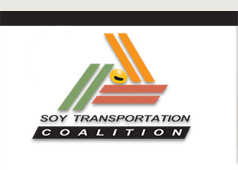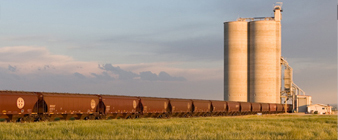 |
 |
|
| eNews • February 2015 | ||
| Promoting a Cost-Effective, Reliable and Competitive Transportation System |
||
 STC analysis monitors rail performance for 2014 harvest
STC analysis monitors rail performance for 2014 harvest
The Soy Transportation Coalition (STC) is working with the University of Minnesota on a research project, “2014 Harvest: Attaching a Garden Hose to a Fire Hydrant."
Summary: January 30th Rail Service Results
“It’s encouraging to hear such dramatically different rail service testimonials this year compared to last year from grain handlers,” explains Mike Steenhoek, executive director of the Soy Transportation Coalition. “Last year, there was widespread frustration and exasperation throughout agriculture. This year, rail service - especially in the western parts of the corn and soybean belt - is much more reliable and responsive. Railroads need to be commended for their performance thus far. We hope to see this continue.”
In the most recent update, a remarkable 100 percent of participating grain handling facilities report that cycle times for railroads are faster than a year ago - an increase from 67 percent in the first survey, 70 percent in the second survey, 78 percent in the third survey, and 91 percent in the fourth survey. 69 percent recorded no rail orders as past due - an increase from 33 percent in the first survey, 48 percent in the second survey, 54 percent in the third survey, and 61 percent from the fourth survey. Once again no respondents reported “much more” storage pressure at their facilities; and only 10 percent reported “more” pressure on storage. 90 percent responded that storage pressure was “the same,” “less,” or “much less.” In addition, the number of round trip “turns per month” continues to increase - from 2.2 turns per month in the initial survey to 2.33 turns per month in the most recent survey.
As highlighted in prior updates, the overall favorable performance of the railroads in the analyzed area of the country can be attributed to the following:
- An elongated harvest season. Given how the 2014 harvest occurred over a more elongated period of time, railroads were better able to adjust to the volumes produced by farmers. Historically, when the harvest occurs over a more condensed period of time, railroads are more challenged to accommodate demand for service.
- Railroads have responded to demand. In the most recent survey period, one of the participants stated, “BNSF is performing very well. We have no complaints.”
- Farmers storing grain. Due to the recent retreat in commodity prices, farmers have elected to store more of their soybeans and grain. This has mitigated some pressure thus far on rail demand.
- Favorable weather. While there has been some significant snowfall and cold temperatures over the past couple months, the weather overall has been favorable for transporting soybeans and grain in the surveyed areas. The STC analysis will continue to survey grain receiving locations into March of 2015 in order to monitor how railroads continue to serve agriculture if and when severe winter weather occurs.
- More modest harvest volumes than anticipated. While the 2014 harvest will be regarded as significant and perhaps historic, a number of the surveyed areas have reported more modest volumes than earlier anticipated. Survey respondents mentioned “poorer crops” in certain areas and the harvest not “as expected.”
The sixth bi-weekly survey was disseminated on January 30. The results will be made available during the week of February 16.
The full results of the bi-weekly survey can be accessed at www.soytransportation.org.
Project Description:
While transportation concerns throughout much of 2014 have been evident throughout the country, a particular region - North Dakota, South Dakota, Minnesota, and Nebraska - experienced particular hardship over the past year due to having more limited access to alternative transportation providers and modes. Most of these areas solely rely on freight rail. As a result, the supply/demand transportation imbalance had a more punitive effect on agriculture and individual farmers in these regions than other areas of the country.
Given the acute rail service challenges throughout much of 2014 and given the projected record 2014 harvest, widespread concern regarding rail performance was expressed by grain handlers and farmers in the weeks and months preceding the 2014 harvest.
The research project seeks to monitor and document rail service for the 2014 harvest in areas of North Dakota, South Dakota, Minnesota, and Nebraska. The project will identify and estimate the impact of rail service on the profitability of each state’s agricultural industry and individual farmers.
A component of the research is a bi-weekly survey of 42 grain receiving locations in these states. The surveys began in early November and will extend to March of 2015. Completed anonymously, the survey is comprised of the following questions:
Soy Transportation Coalition |
|
